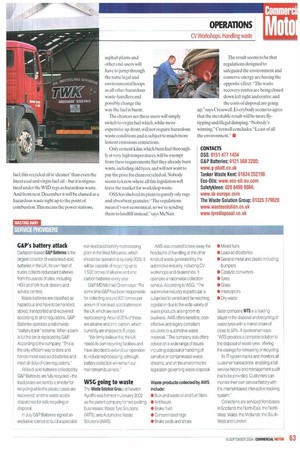WASTING AWAY
Page 65

If you've noticed an error in this article please click here to report it so we can fix it.
SERVICE PROVIDERS
G&rs battery attack
Dariaston-based G&P Batteries is the largest collector of waste lead-acid batteries in the UK. Its own fleet of trucks collects redundant batteries from thousands of sites, including HGV and fork-truck dealers and service centres.
Waste batteries are classified as hazardous and have to be handled, stored, transported and recovered according to strict regulations. G&P Batteries operates a nationwide "battery-bank" scheme. When a bank is fuli the. bin is replaced by G&P. According to the company: "This is the only efficient way to store and handle most lead-acid batteries and meet all duty-of-care regulations."
All lead-acid batteries collected by G&P Batteries are fully recycled -the lead plates are sent to a smelter for recycling while the plastic cases are recovered, and the waste acid is dispatched for safe recycling or disposal.
In July G&P Batteries signed an exclusive licence to build a specialist non-lead acid battery reprocessing plant in the West Midlands, which should be operational by early 2005. It will be capable of recyc:ing up to 1,500 tonnes of alkaline and zinc carbon batteries every year.
G&P MD Michael Green says: "For some time G&P has been responsible for collecting around 800 tonnes per annum of non-lead-acid batteries in the UK which are sent for reprocessing. Around 25% of these are alkaline and zinc carbon, which currently are shipped to Europe.
"We firmly believe that the UK needs its own recycling facilities and have decided to extend our operation to include reprocessing, although battery collection will remain our mainstream business."
WSG going to waste
The Waste Solution Groko at Newton Aycliffe was formed in January 2002 as the parent company for two existing businesses: Waste Tyre Solutions (WTS); and Automotive Waste Solutions (AWS). AWS was created to take away the headache of handling all the other kinds of waste generated by the automotive industry, including CV workshops and dealerships. It operates a nationwide collection service. According to WSG: "The automotive industry in particular is subjected to varied and far-reaching legislation due to the wide variety of waste products arising from its business. AWS offers sensible, costeffective and legally compliant solutions to automotive waste materials." The company also offers advice on a wide range of issues including disposal or handling of sensitive or contaminated waste streams, and on the environmental legislation governing waste disposal.
Waste products collected by AWS include: • Bulk and waste oil and fuel filters • Antifreeze • Brake fluid • Contaminated rags • Brake pads and shoes • Mixed fuels • Lead-acid batteries • General metal and plastic including bumpers • Catalytic converters • Tyres • Glass • Interceptors • Dry waste Sister company WTS is a leading player in the disposal and recycling of waste tyres with a market share of close to 50%. A spokesman says: "WTS provides a complete solution to the disposal of waste tyres, offering the casings for retreading or recycling.
Its IT system tracks and monitors all customer transactions, enabling a full service history and management audit trail to be provided. Customers can monitor their own service history with the internet-based inter-active tracking system."
Collections are serviced from bases in Scotland. the North-East, the NorthWest, Wales, the Midlands, the SouthWest and London.






































































































































































































